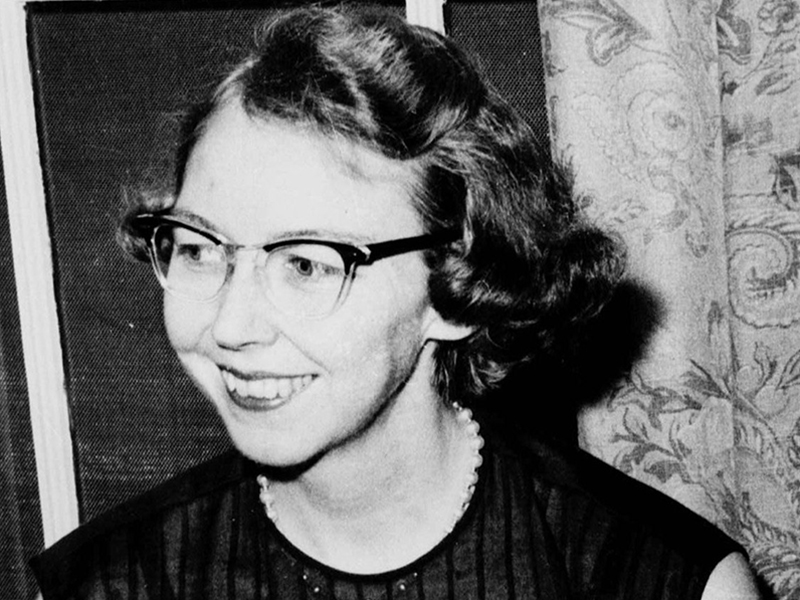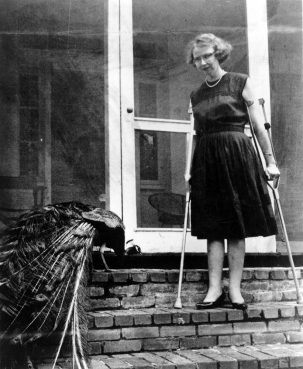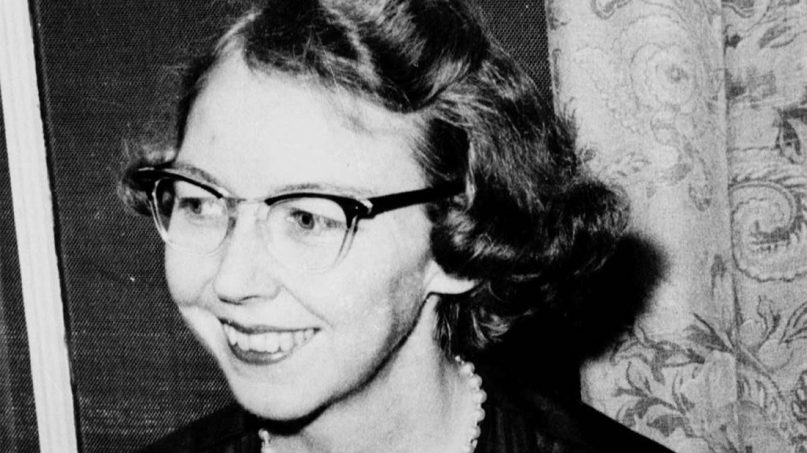
Author Flannery O’Connor in 1962. (AP Photo)
(RNS) — “You have to suffer as much from the Church as for it,” Catholic novelist Flannery O’Connor once wrote, “but if you believe in the divinity of Christ, you have to cherish the world at the same time that you struggle to endure it.”
American Catholics know the feeling this Lent.
Reeling from one headline about clergy sexual abuse and cover-up after another, including news this month that two former U.S. bishops accused of sexual harassment have been barred from ministry, many Catholics feel as if they’ve been in penitential mode since long before Ash Wednesday.
The question for those still clinging to the Barque of Peter in scandal time is not whether they’ll endure but how.
RELATED: Taking stock of the clergy sexual abuse crisis: Protecting children
Endurance seemed easier in O’Connor’s day. When she penned those words to a non-Catholic fan in 1955, Catholic seminaries, convents and parochial schools were bursting at the seams; the U.S. senator who would become America’s first Catholic president was gearing up for his first run at the nomination; and then-Bishop Fulton Sheen was commanding some 30 million viewers a week for his prime-time television show. Anti-Catholic bigotry still ran high in many circles, but the public image of priests was closer to Bing Crosby in “Going My Way” than John Geoghan in “Spotlight.”
As for church attendance, the pews were as full as the seminaries: Gallup polls show that roughly three in every four Catholics attended Mass weekly in 1955.
Last year, fewer than four in 10 did — and that was before Catholics learned of the sexual abuse allegations against now-defrocked Cardinal Theodore McCarrick and his enablers in the hierarchy or read the stomach-churning Pennsylvania Grand Jury Report.
The scandals have taken their toll, and not only on abuse survivors. A Gallup poll conducted in December found that fewer than a third of American Catholics now rate the honesty of clergy highly, down from almost half who did so two years earlier.
Yet recent Gallup polls also found that the proportion of Americans who identify as Catholic remains stable at 22 percent, as compared with 24 percent in 1955. More than half of Catholics still say religion is very important in their lives.
Modest as those numbers may seem, Gallup senior scientist Frank Newport calls them “remarkable” in light of the declining number of Protestants who embrace a denominational identity and the rising number of Americans who eschew any religious identity at all.

Author Flannery O’Connor with a peacock in an undated photo. Photo by Joe McTyre/LOC/Creative Commons
The influx of Hispanic Catholics in the U.S. explains some of that numerical stability. But there are also theological reasons, the prime one being that Catholics believe the church is, as O’Connor explained in her letter, “somehow the body of Christ and on this we are fed.”
For Catholics who believe that Jesus Christ himself founded the Catholic Church and that his biblical promise that “the gates of hell shall not prevail against it” holds true even in the face of abusive or negligent priests, bishops or popes, leaving isn’t an option. They must stay and fight. Or as O’Connor put it, cherish and endure.
For O’Connor, endurance meant praying and attending Mass daily, steeping herself in Scripture and the writings of the saints and turning her gimlet eye on her own failings as well as the pious posers, smug skeptics and clueless co-religionists she skewered in her stories.
Perhaps most importantly, it entailed what she described as “stalking joy” — choosing each day to focus on the gift of grace amid the horrors of human suffering and refusing to let another’s sin steal her faith.
O’Connor, who would have turned 94 this week had lupus not cut her life short, never confronted a church scandal as shocking and shattering as today’s abuse crisis. But most clerical abusers whose crimes are coming to light today were ordained closer to her time than ours. And even if O’Connor could never imagine the harm they would inflict, her Christian realism left her few illusions about the sinlessness of the Church’s earthly leaders.
Even the communion of saints “is a communion created upon human imperfection,” O’Connor said, “created from what we make of our grotesque state.”
The unflinching focus on the reality of human evil and the necessity of grace that made O’Connor’s work too edgy for many Catholic readers in her day is precisely what makes her perspective valuable in our own. Arguing that “it is a sign of maturity not to be scandalized,” O’Connor challenges the notion that only brainwashed dupes keep the faith in the face of outrage.
And she offers her disillusioned fellow Catholics a powerful reminder that the Easter joy toward which they are journeying these 40 days remains within their grasp all year long, even during the long Lent of scandal time.
(Colleen Carroll Campbell is an award-winning author, journalist and former presidential speechwriter whose third book, “The Heart of Perfection: How the Saints Taught Me to Trade My Dream of Perfect for God’s,” will be published by Simon & Schuster in May. The views expressed in this commentary do not necessarily represent those of Religion News Service.)





